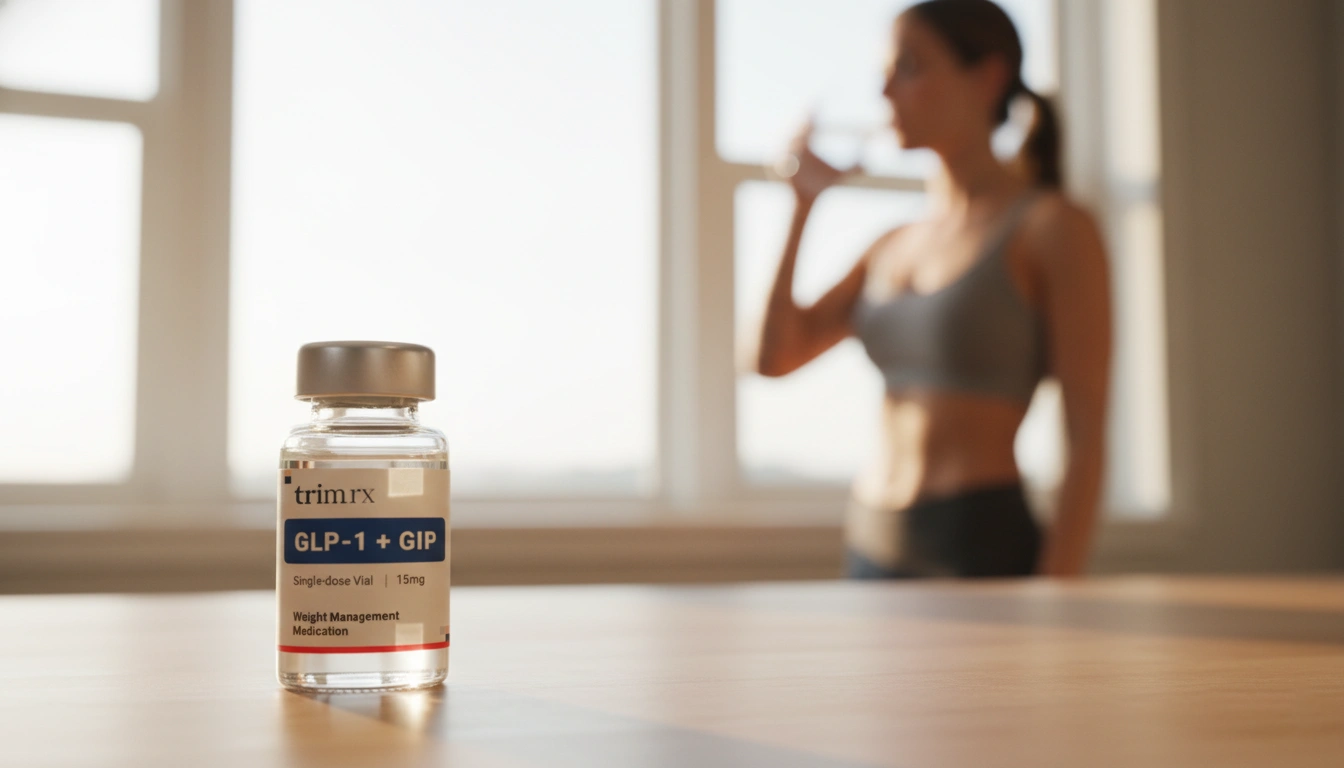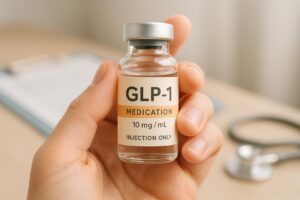Why Is GLP-1 Not Working for Me? Understanding the Factors Behind Weight Loss Challenges

Introduction
Did you know that approximately 13-15% of individuals taking GLP-1 medications for weight loss do not experience significant weight reduction? This surprising statistic highlights a critical issue faced by many embarking on their weight loss journey with GLP-1 receptor agonists, such as Ozempic and Wegovy. While these medications have been hailed as revolutionary tools in the fight against obesity, they do not guarantee success for everyone.
At TrimRx, we understand the complexities of weight loss and the frustrations that come when expected results do not materialize. In this blog post, we aim to explore the reasons why GLP-1 medications may not be working for some individuals, the importance of a comprehensive weight loss strategy, and how our personalized approach can help overcome these challenges.
We will delve into the various factors that may affect the efficacy of GLP-1 medications, including lifestyle choices, medication adherence, underlying health conditions, and more. Together, we will examine how a tailored plan can provide the support you need to achieve your weight loss goals. By the end of this article, you will have a better understanding of why GLP-1 medications may not be producing the desired results and what steps you can take to enhance your weight loss journey.
The Role of GLP-1 Medications in Weight Loss
GLP-1 medications mimic the action of the naturally occurring hormone glucagon-like peptide-1, which regulates appetite and insulin secretion. They work by reducing hunger, increasing feelings of fullness, and slowing gastric emptying, which can lead to decreased food intake and, ultimately, weight loss. Medications such as Ozempic and Wegovy have shown promising results in clinical trials, with many participants experiencing significant weight loss.
However, it’s essential to recognize that weight loss is a multifaceted process influenced by various biological, psychological, and social factors. While GLP-1 medications can be an effective component of a weight loss strategy, they are not a one-size-fits-all solution.
Understanding Non-responders
A non-responder is typically defined as someone who does not achieve at least a 5% reduction in body weight after three months of treatment with a GLP-1 medication. Research indicates that about 13-15% of people fall into this category. Factors contributing to this phenomenon include:
- Individual Biochemistry: Each person’s metabolism and hormonal balance are unique, influencing how they respond to medications.
- Underlying Health Conditions: Conditions such as type 2 diabetes, thyroid disorders, and psychological issues can complicate weight loss efforts.
- Lifestyle Factors: Diet, physical activity, sleep, and stress management play significant roles in the efficacy of weight loss medications.
Common Reasons GLP-1 Medications May Not Be Effective
1. Lifestyle Factors
Diet and Nutrition
While GLP-1 medications can help suppress appetite, they are most effective when combined with a healthy diet. Studies show that individuals who adopt a balanced eating plan rich in whole foods, lean proteins, healthy fats, and fiber tend to experience better outcomes.
- Caloric Intake: Consuming calorie-dense foods can counteract the appetite-suppressing effects of GLP-1 medications. It’s crucial to prioritize nutrient-dense options that promote satiety.
- Meal Timing: Eating regular meals and avoiding excessive snacking can help maintain stable blood sugar levels and support weight loss.
Physical Activity
Regular exercise is a cornerstone of effective weight management. Many individuals on GLP-1 medications may not engage in sufficient physical activity, which can hinder their weight loss efforts.
- Strength Training: Incorporating strength training can help maintain muscle mass during weight loss, which is essential for sustaining metabolic rate.
- Aerobic Exercise: Aerobic activities, such as walking, running, or cycling, are vital for overall health and can significantly enhance the effectiveness of weight loss medications.
2. Medication Adherence
Properly following the prescribed regimen is crucial for the success of GLP-1 medications. Missing doses or not adhering to the recommended schedule can diminish their effectiveness.
- Dosage Consistency: It’s essential to take the medication at the same time each week. Inconsistent use can lead to fluctuations in appetite control and weight loss results.
- Understanding Instructions: Many individuals may not fully understand how to take their medication, leading to mistakes. Ensuring clarity about dosing can help improve adherence.
3. Psychological Factors
Emotional and psychological aspects play a significant role in weight loss. Issues such as stress, anxiety, and depression can lead to unhealthy eating behaviors and hinder weight loss efforts.
- Emotional Eating: Many individuals struggle with emotional eating, using food as a coping mechanism for stress or negative emotions. Addressing these underlying issues is crucial for long-term success.
- Support Systems: Engaging in support groups or therapy can provide valuable tools to manage emotional eating and develop healthier coping mechanisms.
4. Underlying Health Conditions
Certain medical conditions can impact the effectiveness of GLP-1 medications and overall weight loss success. Individuals with untreated or poorly managed conditions may face additional challenges.
- Metabolic Disorders: Conditions such as hypothyroidism or insulin resistance can slow down metabolism and hinder weight loss.
- Psychiatric Disorders: Some psychiatric medications can promote weight gain, complicating efforts to lose weight while on GLP-1 medications.
5. Medication Interference
GLP-1 medications may interact with other medications, leading to reduced effectiveness or additional weight gain. It’s essential to discuss all medications with your healthcare provider to identify potential interactions.
- Consulting with Providers: Open communication with your healthcare team can help identify and adjust any medications that may be counterproductive to weight loss efforts.
What to Do If You’re Not Seeing Results
If you find yourself not achieving your weight loss goals while on GLP-1 medications, it’s important to take proactive steps. Here are some strategies to consider:
1. Consult with Your Healthcare Provider
Open dialogue with your healthcare provider is essential. They can assess your situation, review your medication regimen, and suggest any necessary adjustments.
- Dosage Adjustment: Sometimes, a higher dose of GLP-1 medication may be needed to elicit a response.
- Alternative Treatments: If GLP-1 medications are not effective, your provider may suggest other weight management options or therapies.
2. Optimize Lifestyle Changes
Reflect on your current lifestyle habits and consider areas for improvement:
- Nutrition: Keeping a food diary can help identify eating patterns and areas for change. Focus on whole, unprocessed foods and balanced meals.
- Physical Activity: Aim to increase your activity levels gradually. Even small changes can make a difference.
3. Address Psychological Factors
Consider seeking support for emotional or psychological issues that may be impacting your weight loss journey.
- Therapy and Counseling: Professional help can provide strategies to manage emotional eating and develop healthier coping mechanisms.
- Support Groups: Engaging with others facing similar challenges can foster motivation and accountability.
4. Monitor Progress
Keep track of your weight loss journey, not just in terms of numbers on the scale but also how you feel physically and emotionally.
- Non-Scale Victories: Celebrate improvements in energy levels, mood, and physical fitness, regardless of weight.
- Regular Check-ins: Schedule regular follow-ups with your healthcare provider to assess progress and make necessary adjustments.
How TrimRx Can Help
At TrimRx, we believe that sustainable weight loss is achievable through a personalized, medically supervised approach. Our programs are designed to provide support and guidance tailored to your unique needs, ensuring that you have the tools necessary for success.
- Personalized Assessment: We offer a free assessment quiz to determine your eligibility for our prescription weight loss medications. This helps us create a customized treatment plan that aligns with your goals and lifestyle.
- Comprehensive Support: Our services include doctor consultations, medication management, lab work, and ongoing support to ensure you remain on track.
- Quick-Access Supplements: Additionally, we provide our GLP-1 Daily Support and Weight Loss Boost supplements, which can enhance your weight loss journey and overall wellness.
If you’re ready to take the next step, we encourage you to explore our personalized weight loss solutions and take our free assessment quiz here.
Conclusion
Understanding why GLP-1 medications may not work for everyone is crucial for anyone embarking on a weight loss journey. Factors such as lifestyle habits, medication adherence, underlying health conditions, and psychological influences can significantly impact the efficacy of these treatments. It’s essential to take a comprehensive approach that combines medication with healthy lifestyle changes and ongoing support.
At TrimRx, our commitment to safe and effective weight loss solutions is backed by personalized care and continuous support. We recognize that every individual’s journey is unique, and we are here to partner with you as you work towards your health and wellness goals.
If you find that your current weight loss plan is not yielding the results you desire, we encourage you to consult with a healthcare provider and explore the possibility of our personalized programs. Together, we can navigate the path to successful weight management.
FAQ
What is the expected weight loss with GLP-1 medications?
Clinical studies show that many individuals lose 5-15% or more of their body weight while on GLP-1 medications, but results can vary.
How long should I wait to see results from GLP-1 medications?
It is generally advised to give GLP-1 medications at least 12 weeks to see significant results. If not, consult your healthcare provider.
Can I take GLP-1 medications while on other medications?
It’s essential to discuss all medications with your healthcare provider to identify any potential interactions that may affect weight loss.
What should I do if I experience side effects from GLP-1 medications?
If you encounter side effects, talk to your healthcare provider about adjusting your dosage or exploring alternative treatments.
How can TrimRx support my weight loss journey?
TrimRx offers personalized weight loss programs, including prescription medications and supplements, along with ongoing support and consultations to help you achieve your goals.

Transforming Lives, One Step at a Time
Keep reading
GLP-1 Medication Side Effect Checker
Worried about GLP-1 medication side effects? Use our free checker for Semaglutide, Liraglutide, and more to learn what to expect and stay informed!
GLP-1 Dose Titration: Research Insights
Gradual GLP-1 dose increases balance weight loss and GI side effects; personalized titration and monitoring improve real-world outcomes.
Wave Life Sciences unveils Phase I results for obesity treatment
Wave Life Sciences’ single-dose RNA therapy showed 4% total body fat reduction and promising Phase I results.



